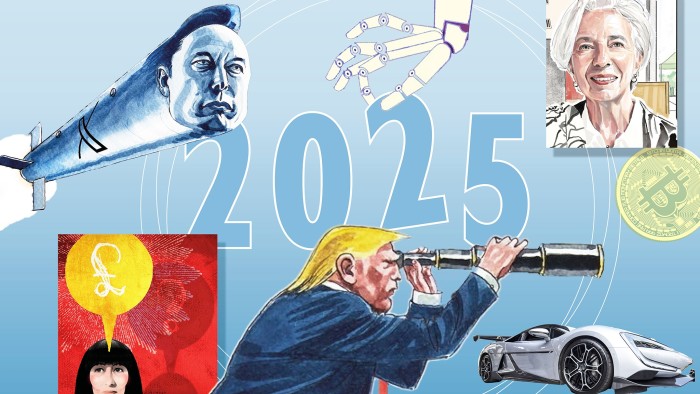A recent feature of the FT’s annual predictions has been that what was once seen as a light-hearted exercise has increasingly had to grapple with issues of war and peace. This year our writers offer predictions on conflicts in Ukraine, the Middle East, Sudan — and another kind of war, of tariffs. Readers may disagree, but the scenarios aim to be plausible. Our chief economics commentator Martin Wolf makes a call on US interest rates, and we have lighter fare including where bitcoin prices might go, AI agents, and a revival (or not) of the CD. Donald Trump’s return to the White House means the US president looms large.
Our collective performance last year was not among our best, with five wrong answers. Following polling at the time, we discounted Trump’s re-election chances. Japanese interest rates did rise above zero; investors didn’t move back into bonds as expected; X didn’t go bankrupt; and there was no deal, yet, to return the Parthenon marbles to Greece.
Single minds, it seems, can sometimes beat 20: two entrants to our reader competition got all 20 questions right, and the overall winner, Ercole Durini of London, was even spot on with the tiebreaker. Readers are invited to submit their own answers again this year, with their real name and email. Happy New Year! Neil Buckley
FT readers: submit your predictions for 2025
Will Donald Trump start a full-scale tariff war?
Yes, on balance, but it’s not a dead cert. By “tariff war” let’s say at least 10 per cent tariffs on at least half of US imports by the year-end. Nobody really knows with Trump. But he will definitely hit imports from China, about 15 per cent of the US total. Mexico and Canada together are around 30 per cent, and their leaders Claudia Sheinbaum and Justin Trudeau — or a successor — will insist on their toughness on immigration to avert Trump’s threatened 25 per cent tariffs.
Other trading partners will also make offerings and promise retaliation. Over time some will succeed, but Trump will probably be enjoying the power-trip and the revenue too much to get rid of most tariffs by December. Alan Beattie
Will there be a peace deal between Ukraine and Russia?
Yes. But the US president will have to threaten tougher sanctions and escalate American support to Kyiv to persuade Moscow to engage seriously in talks. US allies will convince Trump not to take Nato membership for Ukraine off the table, at least at the outset.
Ukraine’s Volodymyr Zelenskyy will agree to de facto but not de jure Russian control of the land it currently occupies, with some land swaps, in return for European security guarantees with US support, while Ukraine’s Nato accession is ultimately put on ice. Vladimir Putin will calculate that European resolve will eventually falter. Ben Hall
Will US interest rates end the year lower than now?
No. In the aftermath of the forecasts published by Jay Powell’s Federal Reserve after its December meeting, markets predicted that the fed funds rate would be 3.9 per cent in December 2025. If so, that would be just a little more than one quarter point cut below December 2024’s target range of 4.25-4.5 per cent.
Even that was too optimistic. Trump’s tax cuts, tariffs and deportations will increase inflationary pressure in an economy that is displaying sticky inflation.
The Fed will have to be cautious. So it will be, unless (as is conceivable) the stock market collapses. Meanwhile, Christine Lagarde’s ECB and the Bank of England will continue to cut, creating further divergence. Martin Wolf
Will Emmanuel Macron survive as French president?
Yes. But that the question is even being asked shows the weakened position of a man once likened to Jupiter for his top-down style. With about 30 months left on his second term, Macron is smarting from his decision to call snap elections in the summer that his camp lost.
The consequences of the vote have put a target on the president’s back: a hung parliament that cannot even pass a budget, four prime ministers in a year, and his signature achievements on the economy eroding.
All this has emboldened both his longtime far-right antagonist Marine Le Pen and the far left, who have called for him to step down to unblock the gridlock. Jupiter/Macron has insisted he would never do so. Leila Abboud
Will the Magnificent Seven take a fall?
No, but they won’t ride a lot higher either. The march of Alphabet, Amazon, Apple, Meta, Microsoft, Nvidia and Tesla reflects America’s private sector dynamism, Silicon Valley’s leadership in digital tech and investor hype around AI. These factors will hold strong in 2025; the incoming US administration is in essence a quasi-takeover of a stagnant political world by a vibrant private sector, led by tech.
But three big caveats will limit further expansion. Capex has exploded to a point where it may undermine profitability; investor hype around AI is so wild that disappointment seems inevitable. And sky-high valuations are already prompting some investors to seek alternatives like smaller tech.
Not even AI can escape financial gravity in the long run. Gillian Tett
Will Chinese export prices fall further?
Yes. The disinflationary downdraught that China exports to the world is set to deepen. The competitiveness of Chinese companies — particularly high-tech manufacturers — means on aggregate Chinese export prices, in renminbi, are likely to fall even more sharply.
China’s export price index, down by 5.2 per cent year on year in October 2024, could slump as far as 10 per cent in some months in 2025.
That will deliver a big competitive shock to companies that compete with Chinese rivals, help Beijing to offset any increase in US tariffs — and amplify the risk of cheap Chinese goods displaced from America flooding other markets. James Kynge
Will Elon Musk and Donald Trump fall out?
No. Though Trump is famously intolerant of competing egos, the benefit for Musk of staying on the president’s good side is too great to squander. Even before Trump has taken office, Musk’s net worth has soared by roughly two-thirds on the expectation that deregulation will boost Tesla, SpaceX, Neuralink and his other companies.
Expect him to stick around at least until July 4 2026 — the day his and Vivek Ramaswamy’s “Department of Government Efficiency” expires. Edward Luce
Will Germany relax its debt brake?
Yes. Calls to loosen the Schuldenbremse — the constitutional clause that limits central government borrowing to 0.35 per cent of GDP in any given year — are growing louder as Germany grapples with massive spending needs, notably in defence, and a stagnating economy.
A key reason for the collapse of Olaf Scholz’s coalition, the debt brake has become a central campaign issue ahead of February’s elections. CDU candidate Friedrich Merz, whose party is leading in the polls, will have to agree to some form of easing in any coalition agreement, whether with the Social Democrats or the Greens, both staunch debt brake critics. Anne-Sylvaine Chassany
Will the bond market buckle?
No. It might creak, but it won’t break. Investors are on high alert for any sign that Trump’s relaxed stance on borrowing and urge to cut taxes, in an era when debt levels are already high, could lead to a “Liz Truss” moment in the US government bond market.
It’s not impossible given the inflation likely to stem from tariffs and from immigration policy, but a disorderly loss of confidence in Treasuries would be so disastrous for US markets, including stocks, that the comeback president is unlikely to test investors’ nerves. Katie Martin
Will China’s carbon emissions fall?
No. Emissions from the world’s biggest contributor to greenhouse gases may be peaking ahead of a pledge to do so by 2030, according to some experts, but bringing them down will be the hard part.
China’s 2024 levels are expected to be flat or a small increase from 2023, thanks to unrivalled solar and electric vehicle take-up and a depressed building sector that meant less highly-polluting steel and cement. But President Xi Jinping’s economic stimulus efforts in 2025 are likely to offset the big push on solar, EVs and batteries as energy demand rebounds. Emiliya Mychasuk
Will Britain’s Labour government stick to its promise not to raise taxes further?
Yes, for now. But the fact that opposition MPs and interviewers are probing this issue like a tongue on a sore tooth tells you it’s a wobbly commitment. Both chancellor Rachel Reeves and Prime Minister Sir Keir Starmer himself have played with various forms of words offering a breather after the £40bn tax hike, primarily on business, in October’s Budget. Commitments not to come back for more will be hard to honour as the parliament plays out, given the squeezed state of finances and public services. Miranda Green
Will Israel and the US strike Iran’s nuclear plants?
No. But Israel will be seriously tempted. Prime Minister Benjamin Netanyahu has long vowed to prevent Tehran developing a nuclear weapon. Israel is emboldened and Iran vulnerable after a year of regional conflict. Israel, though, would probably need US support — and its green light — to destroy Iran’s nuclear facilities, and the returning US president, unpredictable as he is, will be wary of igniting the region’s next war.
That calculus, however, could change if Tehran moves closer to a nuclear bomb. One legacy of a grim 2024 in the Middle East is that nothing can be discounted. Andrew England
Will Bitcoin hit $200,000?
Yes. Bitcoin topped $100,000 only in December, so a further doubling might seem a stretch — but why not? The Trump team’s wholehearted embrace of crypto, with digital asset advocates named to top Washington jobs, has already fuelled the post-election ascent to record highs.
Under friendlier leadership, the Securities and Exchange Commission is expected to end its aggressive lawsuits against crypto companies and create rules to make Wall Street banks and asset managers more comfortable to trade and hold crypto. An inflow of institutional money, without the fear of lawsuits, will only send the price of bitcoin higher. Nikou Asgari
Will India’s GDP overtake Japan’s?
No. This will happen soon (and it’s already true at purchasing power parity) but is more likely in 2026 than 2025. Japan will end the coming year with the larger economy by 4.7 per cent, according to the IMF, and with Indian growth slowing in recent quarters it will take longer than 12 months for a sorpasso.
Exchange rates could make the difference, but the yen is already weak and the rupee strong, so the odds are against it. Robin Harding
Will electric vehicles make up more than a quarter of global auto sales?
No. If the trend over recent years continued, they might, but the actual figure may be little over 22 per cent. 2025 will be another difficult year for the automotive industry thanks to waning consumer enthusiasm, outside China, for electric vehicles. But to meet tougher emissions rules in Europe and EV sales targets in the UK, carmakers will launch dozens of new electric cars, and continue to spend billions of dollars in discounts to make them more affordable.
China will still drive market growth as EVs reach price parity with petrol vehicles. The biggest uncertainty is the US, where measures by the incoming administration might slow the EV transition. Kana Inagaki
Will Javier Milei lift Argentina’s exchange controls?
Yes. Fearful of triggering a spike in inflation and worried about low reserves, the libertarian president has so far resisted scrapping tight limits on how much foreign currency Argentine individuals and companies can buy.
But in 2025 Milei will take the plunge. The need to spur foreign investment and make good on his small-state instincts will loom large in his thinking when judging the moment for what will still be a risky move. Michael Stott
Will the war in Sudan continue?
Tragically, yes. Sudan has become a proxy conflict, sucking in powers from the UAE to Russia. The main Sudanese combatants, Gen Abdel Fattah al-Burhan, the de facto president, and Rapid Support Forces head Mohamed Hamdan Dagalo, known as Hemeti, both still harbour illusions of victory.
Too many actors, external and internal, are making money for peace to prevail. The war has displaced 12mn people and brought millions close to famine. It would take a huge international push to stop it. Sadly, Sudan is too far down the world’s list of priorities for that to happen. David Pilling
Will we have AI agents we can use?
Yes. “Agentic AI” is shaping up to be the most-hyped phrase of next year — by big tech, AI start-ups and corporates. An AI “agent” is software that lives on your phone or web browser and can complete digital tasks on your behalf — from filling out online forms to compiling your grocery basket, sending emails or transcribing your calls.
We’ll see offerings next year from the likes of Google, OpenAI, Anthropic, Microsoft and others. Ultimately, the agent that sticks could become our main conduit to the digital universe. Madhumita Murgia
Will there be another big Hollywood studio deal?
Yes. In 2024 Paramount became the first Hollywood studio to cave under the new economics of streaming, with the Redstone family selling to tech billionaire Larry Ellison and his film-producing son, David.
Warner Bros Discovery is next. Like Paramount, Warner is saddled with declining cable TV businesses. CEO David Zaslav practically put a “for sale” sign on the cable channels in December by hiving them off into a separate unit — and hiring three investment banks as advisers. A sale to a rival, possibly the upcoming spin-off of Comcast’s cable TV business, or to a private equity firm, seems on the cards. Christopher Grimes
Will CDs begin a long-term revival similar to vinyl?
No. The shiny disc is defying predictions of its demise — sales are being fuelled by the format’s popularity in South Korea’s K-pop. But an end to decline is more likely than a take-off in long-term growth. In K-pop, CDs are mostly bought for the packaging (limited edition photos, golden tickets for meet-and-greets). Similar sales tactics have been adopted by western stars such as Taylor Swift. But the CD’s use as a marketing tool isn’t the same as a vinyl-style revival. Ludovic Hunter-Tilney
Tiebreaker: How many goals will be scored in the Fifa Club World Cup in the US?







